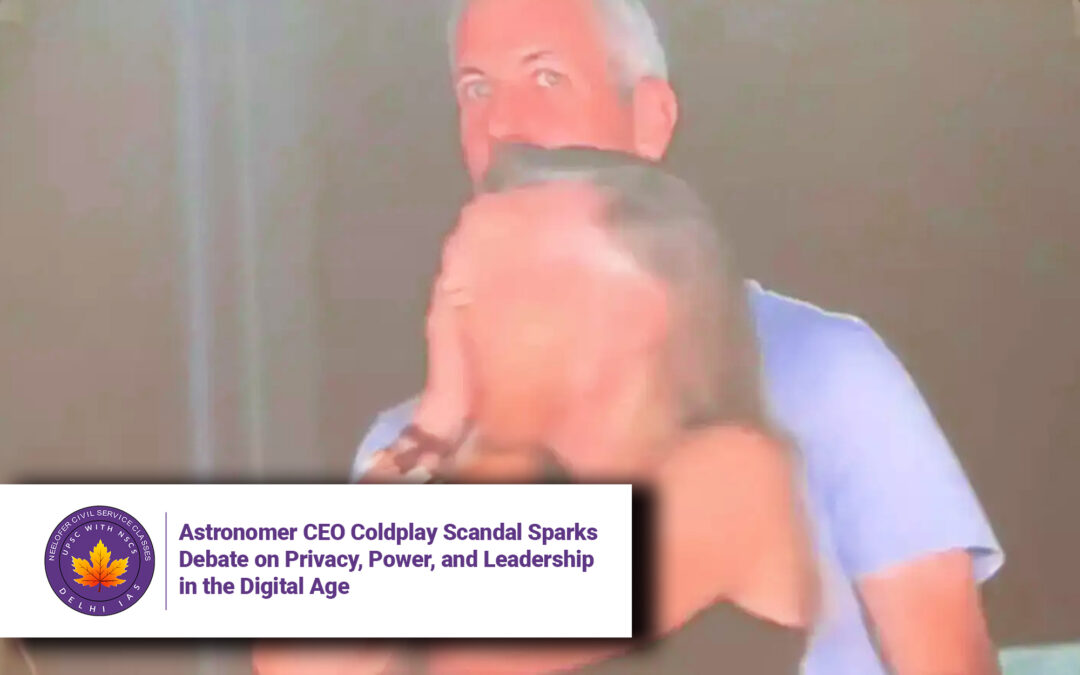Astronomer CEO Coldplay Scandal Sparks Debate on Privacy, Power, and Leadership in the Digital Age
Why in News?
The recent scandal involving the CEO of Astronomer, Andy Byron, dubbed “Coldplaygate,” has gone viral after a video surfaced showing him with a subordinate at a Coldplay concert. This incident reignited discussions around CEO conduct, the blurring of professional and private lives, and how corporate boards must respond in a hyper-online world. 
Introduction
In what has quickly become one of the most talked-about corporate controversies of the year, Andy Byron, the CEO of Astronomer, was seen at a Coldplay concert in a questionable situation with his chief people officer. The public nature of the scandal, captured on the venue’s jumbotron and amplified by social media, left the company scrambling to manage its image. The event has become a textbook case of how quickly corporate reputation can unravel in today’s surveillance-heavy environment.
Key Issues and Institutional Concerns
1. Power and Delusion in the Executive Suite
Beth Kowitt argues that people in powerful positions often believe they can escape consequences, even in public spaces. CEOs—who are usually seen as smart, responsible leaders—sometimes make poor decisions under the illusion of invincibility.
2. No More Line Between Public and Private Life
The idea of a private life is becoming obsolete for executives. Social media, smartphone cameras, and viral content mean that everything a CEO does—publicly or privately—can become front-page news.
3. History Repeats: CEOs and Misconduct
The article references past cases like the Ashley Madison data breach, which revealed a correlation between personal misconduct and corporate scandals. Boards must now factor in executives’ personal conduct when assessing risk and performance.
4. Internet Uproar and Loss of Narrative Control
The internet exploded with memes, false statements, and misinformation after the incident. Online sleuths misidentified people, leading to harassment and widespread confusion. The speed of this chaos highlights how little time companies have to react in the digital age.
5. Corporate Accountability and Policy Failure
The board took over 48 hours to respond, which allowed the story to spiral out of control. There was no internal playbook to manage such an event. This delay and lack of strategy reveal a gap in corporate readiness for reputational crises.
Challenges and the Way Forward
-
Immediate Crisis Management: Companies must build rapid-response mechanisms for digital scandals.
-
Revise Executive HR Policies: Clearly define the ethical boundaries of executive behavior, especially concerning relationships with subordinates.
-
Monitor Executive Culture: Boards must actively monitor—not just trust—the personal behavior of top executives.
-
Public Image Training: Executives should be coached to understand the stakes of public missteps in today’s connected world.
-
Accept the End of Private Privilege: Companies must prepare for a world where no action goes unseen or unjudged.
Conclusion
The Astronomer CEO fiasco has highlighted how the personal behavior of high-ranking leaders is inseparable from their professional identity. In a world dominated by smartphones and social media, companies must evolve quickly. This scandal is not just a public relations disaster but a wake-up call for corporate governance.
Q&A Section
1. Q: What is “Coldplaygate”?
A: “Coldplaygate” refers to the viral incident where Astronomer CEO Andy Byron was seen at a Coldplay concert with a subordinate, leading to widespread backlash and his resignation.
2. Q: Why did this incident gain so much public attention?
A: The CEO was caught on a jumbotron, and the video quickly went viral online, symbolizing executive misconduct in a very public and relatable setting.
3. Q: What does this reveal about executive privacy in the digital age?
A: The article suggests that CEOs no longer have a “private life,” as everything can be filmed and shared instantly, making discretion and ethics more crucial than ever.
4. Q: How did the company and internet users respond?
A: The company delayed its response, while internet users spread false information, doxxed employees, and created thousands of memes, worsening the chaos.
5. Q: What lesson should other companies learn from this incident?
A: Companies need to prepare for public-facing executive scandals with rapid communication strategies, updated HR policies, and a better understanding of modern digital risks.








